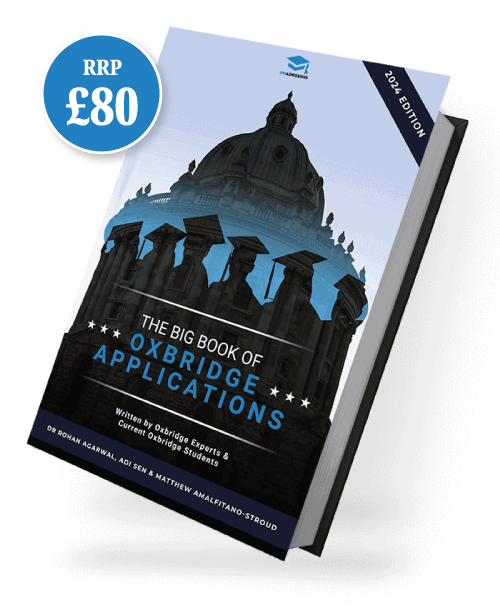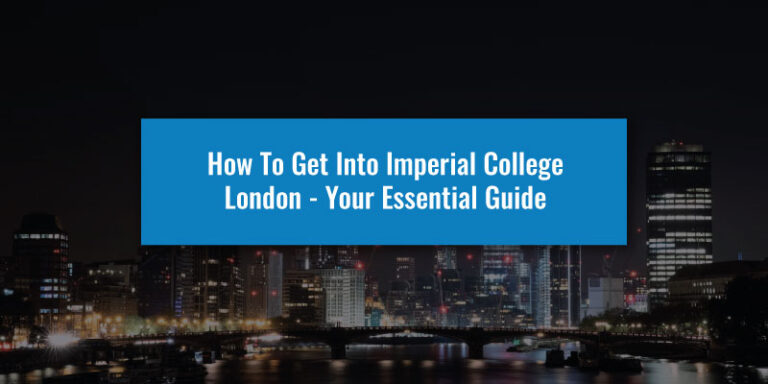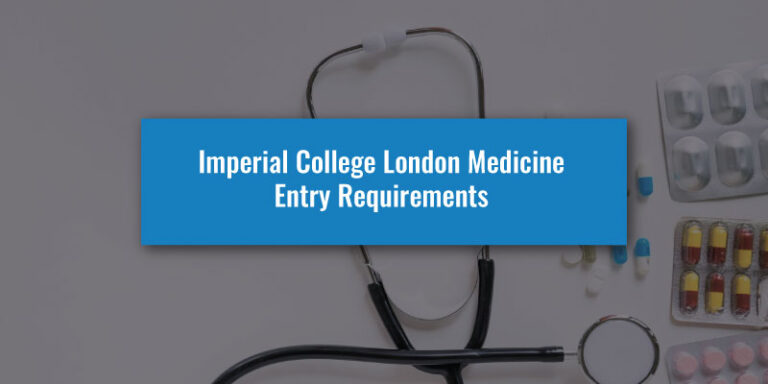Medicine is one of the most popular universities in the UK, and Oxford is one of the most popular universities. As a result, Oxford Medicine is one of the most popular medicine degrees for applicants.
The choice between Oxford and Cambridge is a tough one but once you’ve made it, the next task is to complete the application process. Being one of the highest-ranked universities in the world, Oxford is very difficult to get into – the overall success rate for medicine in 2023 was 9.9%.
In this guide, you’ll learn more about Oxford Medicine. Most importantly, you’ll learn exactly what steps are required to complete the application and have a chance of earning your offer. If you’re ready, then let’s begin!
Ready to start your application
process?
Applying to Oxbridge is notoriously competitive. For some degrees, as few as 6% of all applicants receive an offer. Our Premium Programmes are tailored to triple your chances of gaining an offer from your dream university.
Elliot shares his experiences of working with us and how we helped him to achieve Oxbridge Medicine success.

Oxford Medicine Entry Requirements
The application process for Oxford Medicine is longer than a standard university application and is much more demanding. Below is everything you’ll need to do during this process to be admitted.
A-Levels/IBs
To get into Oxford, you’re going to need to achieve top grades in relevant subjects. While the requirements listed below are the minimum requirements, be aware that a large percentage of successful applicants achieved grades higher than these.
Oxford Medicine A-Level Requirements:
A*AA.
To apply for Oxford Medicine, you must have achieved a grade A in Chemistry and in at least one other science, including Biology, Physics or Mathematics/Further Mathematics.
Oxford Medicine International Baccalaureate Requirements:
39 (766 at Higher Level)
For International Baccalaureates, applicants must have Higher Levels in Chemistry and one other science or Mathematics.
UCAS Personal Statement
Personal Statements for Oxbridge and Medicine have to be sent by October 15th, which is several months earlier than standard UCAS applications. Once sent, your application will be accessible to your chosen Oxford college. However, bear in mind that less importance is placed on the Personal Statement than the other aspects of the application process.
Our Ultimate UCAS Personal Statement Guide provides much more information about how to approach your statement, but the basic things to include are your motivation, research, relevant super/extra-curricular activities and work experience (we’ll cover this later). You may have a lot to discuss, but with the 4,000-character limit, you’ll need to ensure your writing is concise and you only discuss the most important and relevant topics.
In 2025, the UCAS Personal Statement system will be changing into a three-question system that requires applicants to answer multiple predetermined questions about themselves. You will still be covering the same general topics, just in a more rigid, less free-form structure. You can find out more about this here:
UCAT
Starting in 2024, Oxford adopted the University Clinical Aptitude Test (UCAT) as a replacement for the BioMedical Admissions Test (BMAT) following its removal. The UCAT is a medicine admissions test designed to test applicants on a variety of general skills that are vital for anyone working in medicine.
Applicants don’t need to achieve a specific score to be considered for interviews, but it definitely helps to score very highly as you’ll be competing with some very skilled applicants. Preparation is essential for performing well, especially through timed mock testing as the time limits are one of the biggest challenges in the UCAT.
Oxford Medicine Interview
Everything done up until now is viewed by the admissions tutors at your chosen college, who will then shortlist applicants to invite to a series of interviews. For the next few years, all interviews at Oxford will be held remotely, so be sure you have the right hardware and software prepared to interview effectively.
These are traditional panel interviews where you will speak to a university admissions tutor and medical practitioner. Throughout the interviews, you’ll need demonstrate your understanding of the subject, your interest in medicine and your motivation a suitability for studying at Oxford.
Subject knowledge will be tested, but don’t worry about expressing an extremely high level of knowledge in everything you’re asked about. Interviews are more about seeing your thought process than getting perfectly correct answers about complicated topics.
Be aware that getting an interview for Oxford Medicine can be quite difficult in itself. Through 2021 and 2023, only 23% of applicants were interviewed – less than a quarter of all applicants.
Other Requirements
So those are the four main aspects of the Oxford medicine application, but they’re not the only things to consider.
Work Experience:
Work experience is a must for all medicine applicants as it demonstrates an applicant’s dedication to the subject. It also offers you a chance to learn new skills and reflect upon yourself as an applicant, which is important to display in your Personal Statement and interview.
This work experience needs to be relevant to medicine, but that doesn’t mean you’re limited to hospitals or GP surgeries. These placements can very competitive and difficult to get, but there are a variety of other volunteering option both within the NHS and in external placements like care homes.
UCAS References and Recommendations:
Your UCAS application requires you to fill out all of your information and Personal Statement yourself, but you also need to find a referee to provide a reference for your application. This needs to be someone who has an academic relationship with you, so it will typically be a teacher, head of sixth form or counsellor.
College Selection
Oxford is run via a collegiate system, meaning students are admitted into colleges rather than the university as a whole. Colleges are responsible for many aspects of student life, from accommodation and dining to social events and elements of teaching.
There are over 30 colleges at Oxford, so choosing one to apply for can be difficult. Each college has a unique style, with some being more specialised than others. However, there are certain Oxford colleges that are better for medicine students than other, so exploring these options would be a good place to start your research.
To triple your chances of getting your Oxford offer, study with the world’s first Oxbridge Preparatory School.
Through our unique curriculum, comprehensive resources and large selection of expert tutors, you will be able to create the perfect application. Our programme will get you prepared for every aspect of the application to give you the best chance of studying Medicine at Oxford.
Discover our Oxbridge Medicine Premium Programmes by clicking the button below to enrol and triple your chances of success.
Studying Medicine at Oxford
So now that you know what the application process looks like, it’s time to learn a bit more about the course itself. Being aware of what the course entails and how it may differ from other medicine degrees is important as it will help you to justify why Oxford is the right medical school for you. Plus, knowing these details shows that you’re genuinely interested in studying there.
Oxford Medicine Overview
At Oxford, science and medical knowledge and its application are incredibly important. Unlike some medical schools, clinical teaching is reserved for the latter half of the 6-year course. Years 1 -2 teach students about a wide variety of topics within medicine, while Year 3 sees students intercalate and complete a separate bachelor’s degree in a medicine-adjacent subject (this can be chosen yourself).
In Years – 4 – 6, you’ll still be learning via lectures, practical classes and tutorials. However, this will be combined with clinical placements that will see students working in active hospitals and other medical facilities.
However, lectures are actually much less frequent at Oxford than at other universities. This is because students are expected to act independently for much f their studies and conduct their own research in groups. This is just one of the elements of studying at Oxbridge that makes it more demanding than many other UK universities (learn more about Cambridge Medicine here).
As with any medical school in the UK, you’ll need to register with the General Medical Council to become a fully certified medical professional before graduating. After this, there is a two-year period of service that will be required, known as the Foundation Year, which will let you fully qualify as a doctor.
How Is Oxford Medicine Different?
Competition
While the application process is roughly the same as other UK medical schools, the amount of applicants and standards expected of you makes Oxford one of the most competitive medical schools in the world.
Terms
Oxford Medicine’s term time is much shorter than at most other universities. A full term lasts just eight weeks, but you’ll often have double the amount of work to complete, including essays, scientific worksheets and presentations.
Teaching Style
As we discussed before, Oxford Medicine has a greater emphasis on scientific teaching than other medical schools and favours independent study from its students over regular lectures.
Class sizes at Oxford are also very small much of the time as you’ll be learning with your college-mates rather than the full cohort (which will typically be 2 to 4 students). These sessions are known as Tutorials, a unique teaching style at Oxford which are led by a doctor or professor. While these sessions allow for more dedicated time from your tutors, they can also be very intense and require a lot of independent work to be done beforehand.
This is considered a “Traditional” teaching style which is only used within Oxbridge in the UK. The most common medicine teaching styles in the UK are “Integrated” or “Problem-Based Learning” teaching styles, which you can learn more about in our Oxbridge vs Non-Oxbridge Medical School Guide:
Access "The Big Book Of Oxbridge Applications" For FREE
Learn more about the Oxford Medicine application process in The Big Book Of Oxbridge Applications, available for free here! Through over 350 pages, you will find:
- Proven A-Level study techniques
- 28 example Oxbridge Personal Statements
- Over 40 admissions test practice questions
- Interviews with Oxbridge students and graduates
- Additional downloadable resources
Fill in your details below to claim your digital copy today!

Why Choose Oxford Medicine?
While Oxford is known for being brutal with its workload, it’s important to consider why the teaching is like this. The high standards set for applicants before they’re even admitted show that Oxford only seeks out the students they believe can handle the load. For those that can handle it, they’ll be receiving the most advanced and comprehensive teaching in the UK, allowing them to fully reach their potential in the field.
That may be reason enough to apply but also consider that many want to study at Oxford for the legacy and lifestyle that comes with being there. Life at Oxford isn’t all about work and your free time will be filled with a vast amount of varied activities, events and parties unlike any other university in the world. Plus, the near 1,000-year history of the university is another major selling point, providing you access to some of the oldest education facilities in the world.
Finally, with the prestige that comes with the Oxford name, it’s unsurprising to see that almost 100% of graduates are employed within 6 months, with many progressing on to advanced specialities and other rewarding fields.
These are just some of the broader reasons why Oxford Medicine is so popular, but you may also have your own personal motivation. Whatever your reason, Oxford is more than likely to satisfy what you’re looking for so take a chance and apply if it appeals to you.
Final Tips for Your Oxford Medicine Application
If you think you’ve got what it takes to get into Oxford Medicine, then now’s the time to start your application. Here are some final tips to help you get started:
Going to an Oxford Open Day is essential, as it will let you explore the city, learn more about the colleges and let you ask important questions about the university and application process (remember to make note of what questions you should be asking at an Oxbridge open day).
Your Personal Statement isn’t going to be perfect on the first attempt, so go through as many drafts as you need. One of the toughest parts about writing your statement is the character restriction, so it may help to write a longer draft and edit it down. Generative AI can be helpful in very specific cases but never rely on it to write large chunks of your statement.
The UCAT is all about general thinking skills, so traditional revision won’t be effective for preparing. Instead, you need to focus your efforts on practice questions and mock tests to build your skills and get quicker at answering questions. There are various options for UCAT question banks available, be sure to look for ones that offer worked solutions for each question, as this will be essential for learning from the questions you get wrong.
As with the UCAT, the best way to prepare for your interview is through practice. Try to organise at least one mock exam before the real thing, ideally with someone who you don’t have a close relationship with. If necessary, services are available that will not only provide mock interviews designed to mimic Oxbridge interviews but will also provide in-depth feedback about your performance.
So, that covers the essential information you need to know about applying to Oxford Medicine. Of course, there’s still a lot to learn about the process, so make sure you check out our other free guides and learn how you can enrol in our Oxbridge Medicine Premium Programme today to triple your chances of getting your offer.
UniAdmissions, the world’s first Oxbridge Preparatory School, is here to make sure you get your offer for Oxford Medicine.
At UniAdmissions, we will support you through every single part of the Oxford medical school application process, including the Personal Statement, UCAT and Interview.
Discover our Oxbridge Medicine Premium Programme today to learn how you can enrol and triple your chances of success.








